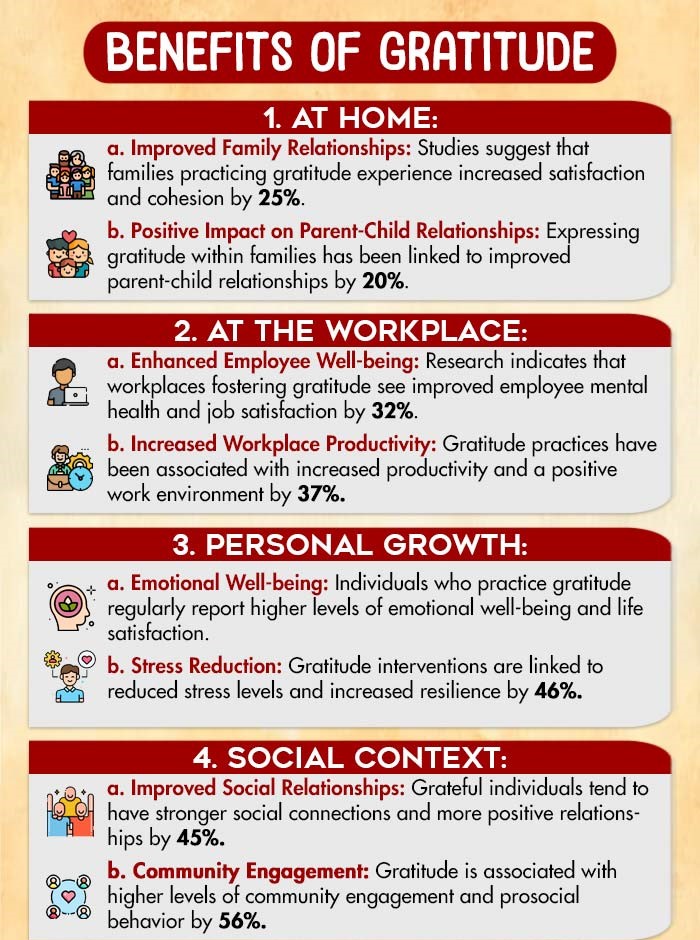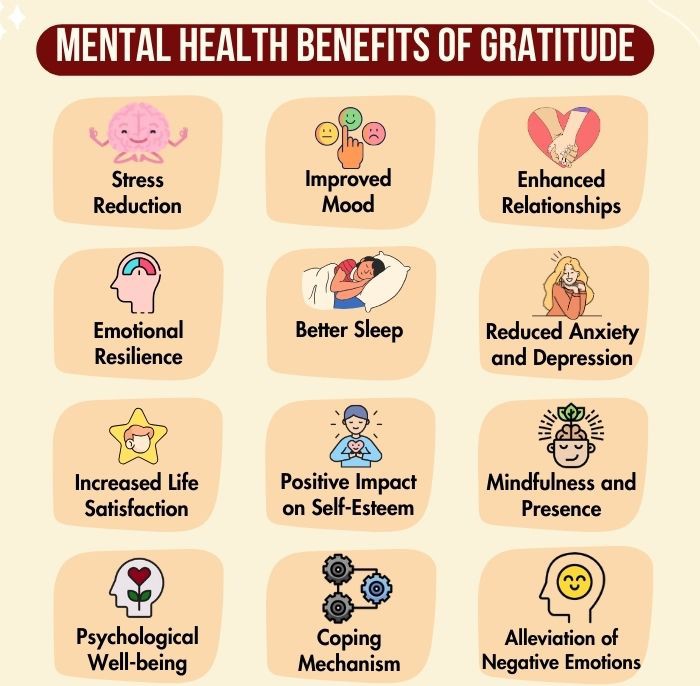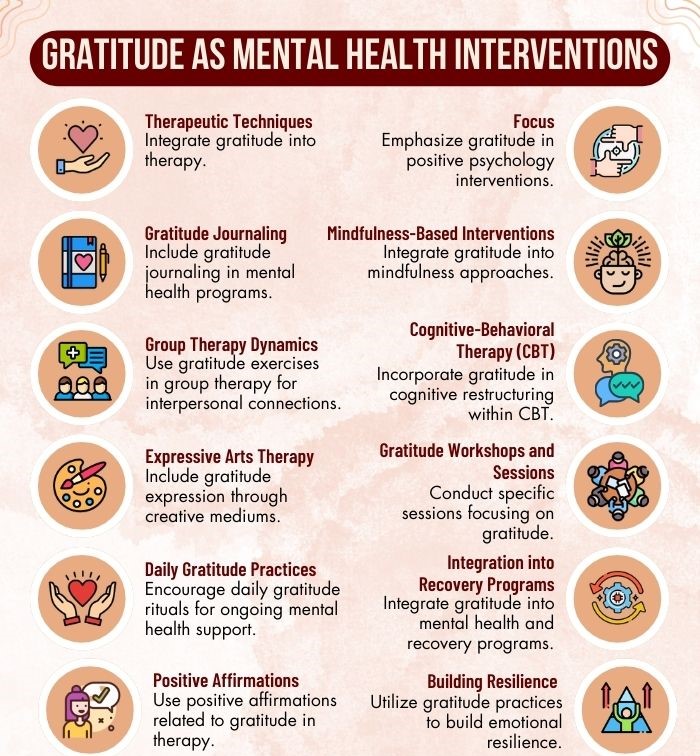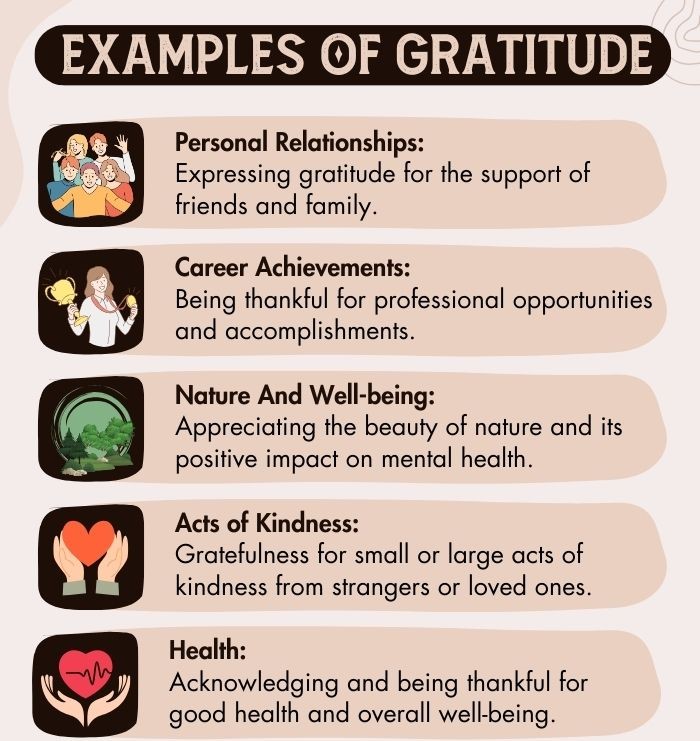Gratitude is an emotion of appreciation and positive response elicited by acts of kindness or generosity. The benefits of gratitude in mental health lie in promoting optimism, reducing stress, and fostering emotional resilience.
What Is Gratitude?
Gratitude is a multifaceted emotion and attitude (( Sansone, R. A., & Sansone, L. A. (2010). Gratitude and well being: the benefits of appreciation. Psychiatry (Edgmont (Pa. : Township)), 7(11), 18–22. )) characterized by a genuine appreciation for the positive aspects of life. It involves recognizing and acknowledging the good things, experiences, and people in one’s life, as well as expressing a sense of thankfulness.
Gratitude goes beyond a mere polite “thank you.” It involves a deep sense of recognition and connection, acknowledging the positive contributions of others or the fortunate circumstances in one’s own life. It is not solely dependent on grand gestures but can be found in everyday moments and simple acts of kindness.

Gratitude In Films
Gratitude, a profound theme, finds cinematic expression (( Powell S. K. (2022). The Science of Gratitude. Professional case management, 27(6), 261–262. https://doi.org/10.1097/NCM.0000000000000602 )) in numerous films and television works. In “It’s a Wonderful Life” (1946), George Bailey learns to appreciate his existence through a journey of self-discovery. Pixar’s “Coco” (2017) beautifully explores familial gratitude and remembrance. “The Pursuit of Happyness” (2006) depicts Chris Gardner’s gratitude for small victories amid adversity.
In “Life is Beautiful” (1997), a father uses humor to shield his son in a concentration camp, showcasing gratitude for life’s beauty in the darkest times. Lastly, American sitcoms like “FRIENDS” (1994-2004) and “The Big Bang Theory” (2007-2019) feature “Thanksgiving episodes” in multiple seasons to highlight the significance of gratitude in our everyday lives and celebrations.
Signs Of Gratitude
The common signs of gratitude include (( Hazlett, L. I., Moieni, M., Irwin, M. R., Haltom, K. E. B., Jevtic, I., Meyer, M. L., Breen, E. C., Cole, S. W., & Eisenberger, N. I. (2021). Exploring neural mechanisms of the health benefits of gratitude in women: A randomized controlled trial. Brain, behavior, and immunity, 95, 444–453. https://doi.org/10.1016/j.bbi.2021.04.019 )) :
- Expressive Thanks: Sincere verbal appreciation.
- Acts Of Kindness: Thoughtful gestures towards others.
- Acknowledgment: Recognizing and appreciating support.
- Positive Body Language: Smiling, eye contact, open posture.
- Reciprocal Behavior: Returning kindness received.
- Reflection On Blessings: Appreciating life’s positive aspects.
- Written Thanks: Sending thank-you notes or messages.
- Sharing Achievements: Acknowledging and sharing personal successes.
- Volunteerism: Giving back through community service.
- Mindful Living: Being present, savoring the moment.
- Gratitude Journals: Reflecting on positive experiences regularly.
- Celebrating Others’ Success: Showing happiness for others’ accomplishments.
- Empathy: Understanding and acknowledging others’ challenges.
Read More About Empathy Here
The Benefits Of Gratitude In Mental Health

The benefits of gratitude in mental health include (( Komase, Y., Watanabe, K., Hori, D., Nozawa, K., Hidaka, Y., Iida, M., Imamura, K., & Kawakami, N. (2021). Effects of gratitude intervention on mental health and well-being among workers: A systematic review. Journal of occupational health, 63(1), e12290. https://doi.org/10.1002/1348-9585.12290 )) :
- Stress Reduction: Gratitude practices are linked to lower stress levels, promoting emotional well-being.
- Improved Mood: Expressing gratitude contributes to a more positive and optimistic outlook on life.
- Enhanced Relationships: Grateful individuals often build stronger, more supportive social connections.
- Emotional Resilience: Gratitude fosters the ability to cope with challenges, promoting emotional strength.
- Better Sleep: Gratitude is associated with improved sleep quality and duration.
- Reduced Anxiety And Depression: Gratitude interventions show promise in alleviating symptoms of anxiety and depression.
- Increased Life Satisfaction: Regularly acknowledging and appreciating positive aspects leads to higher life satisfaction.
- Positive Impact On Self-Esteem: Gratitude is linked to increased feelings of self-worth and confidence.
- Mindfulness And Presence: Grateful living encourages mindfulness, promoting awareness of the present moment.
- Psychological Well-being: Gratitude is a key element in positive psychology, contributing to overall psychological well-being.
- Coping Mechanism: Gratitude serves as a healthy coping mechanism during challenging times.
- Alleviation Of Negative Emotions: Focusing on gratitude helps in reducing feelings of resentment, envy, and bitterness.
Read More About Self-Esteem Here

Challenges In Expressing Gratitude
Challenges (( Hazlett, L. I., Moieni, M., Irwin, M. R., Haltom, K. E. B., Jevtic, I., Meyer, M. L., Breen, E. C., Cole, S. W., & Eisenberger, N. I. (2021). Exploring neural mechanisms of the health benefits of gratitude in women: A randomized controlled trial. Brain, behavior, and immunity, 95, 444–453. https://doi.org/10.1016/j.bbi.2021.04.019 )) in expressing the signs of gratitude include:
- Differing cultural norms impacting comfort levels
- Personal inhibition hindering emotional expression
- Fear of social awkwardness or misunderstanding
- Concerns about misinterpretation leading to hesitation
- Perception of gratitude as vulnerability
- Worries about creating expectations or indebtedness limiting expressions
- Struggles with skepticism or cynicism hindering genuine expression
- A lack of awareness about opportunities for gratitude
- Varied communication styles causing misalignment
- Experiences of crises or trauma that make it challenging for individuals to focus on gratitude amid adversity
How To Practice Gratitude

Consider the following strategies (( Kalamatianos, A., Kounenou, K., Pezirkianidis, C., & Kourmousi, N. (2023). The Role of Gratitude in a Positive Psychology Group Intervention Program Implemented for Undergraduate Engineering Students. Behavioral sciences (Basel, Switzerland), 13(6), 460. https://doi.org/10.3390/bs13060460 )) on how to practice gratitude on a regular basis:
- Gratitude Journal: Regularly jot down things you are thankful for to reinforce positive thoughts.
- Verbal Expression: Vocalize gratitude by sincerely saying “thank you” to others.
- Mindful Reflection: Take moments to mindfully reflect on positive aspects of your day or life.
- Acts Of Kindness: Perform small, thoughtful gestures for others to express gratitude.
- Gratitude Letters: Write letters thanking those who positively impact your life.
- Gratitude Jar: Fill a jar with notes about things you appreciate and revisit them.
- Present Moment Focus: Practice mindfulness to appreciate and savor the current moment.
- Gratitude Meditation: Incorporate gratitude into meditation, focusing on appreciation.
- Celebrate Achievements: Acknowledge personal and others’ accomplishments with gratitude.
- Volunteerism: Give back to the community through acts of service, fostering gratitude.
- Gratitude Rituals: Establish daily or weekly rituals that emphasize gratitude in your routine.
- Positive Affirmations: Use affirmations to consciously recognize and express gratitude.
Takeaway
In the intricate tapestry of our lives, gratitude emerges as a profound thread, weaving its way through the fabric of our daily experiences. The practice of gratitude, with its simple yet transformative power, is not merely a polite gesture but a cornerstone of mental well-being. It serves as a compass, guiding us towards the positive aspects amid life’s challenges.
Cultivating gratitude is akin to nurturing a garden; as we tend to it daily, the blooms of mental health flourish. Its importance resonates in the stress it alleviates, the joy it amplifies, and the resilience it fosters. In the rhythm of our daily lives, embracing gratitude becomes an indispensable melody, harmonizing our minds and enhancing the symphony of our overall well-being.
At A Glance
- Gratitude involves recognizing and appreciating positive aspects of life, extending beyond mere politeness.
- Cinematically, gratitude is explored in films like “It’s a Wonderful Life” and “Coco.”
- Signs of gratitude encompass verbal expressions, acts of kindness, and positive body language.
- The mental health benefits of gratitude are substantial, including stress reduction, improved mood, and enhanced relationships.
- Challenges in expressing gratitude arise from cultural differences and personal inhibitions.
- Strategies on how to practice gratitude involve keeping a journal, verbalizing thanks, and performing acts of kindness.
Frequently Asked Questions (FAQs)
1. How Does Gratitude Reduce Anxiety?
Gratitude reduces anxiety by shifting focus from perceived threats to positive aspects, promoting a more optimistic outlook.
2. How Can Gratitude Be Used To Overcome Fear?
Gratitude helps overcome fear by fostering a positive mindset, redirecting thoughts towards appreciation and away from anxiety-inducing concerns.
3. How Do You Manage Emotions With Gratitude?
The benefits of gratitude in managing emotions involve acknowledging and appreciating positive aspects, besides providing a constructive outlet for emotional well-being.
4. What Prevents Gratitude?
Various factors such as cultural barriers, personal inhibitions, and fears of vulnerability can prevent the practice and expression of the signs of gratitude.















